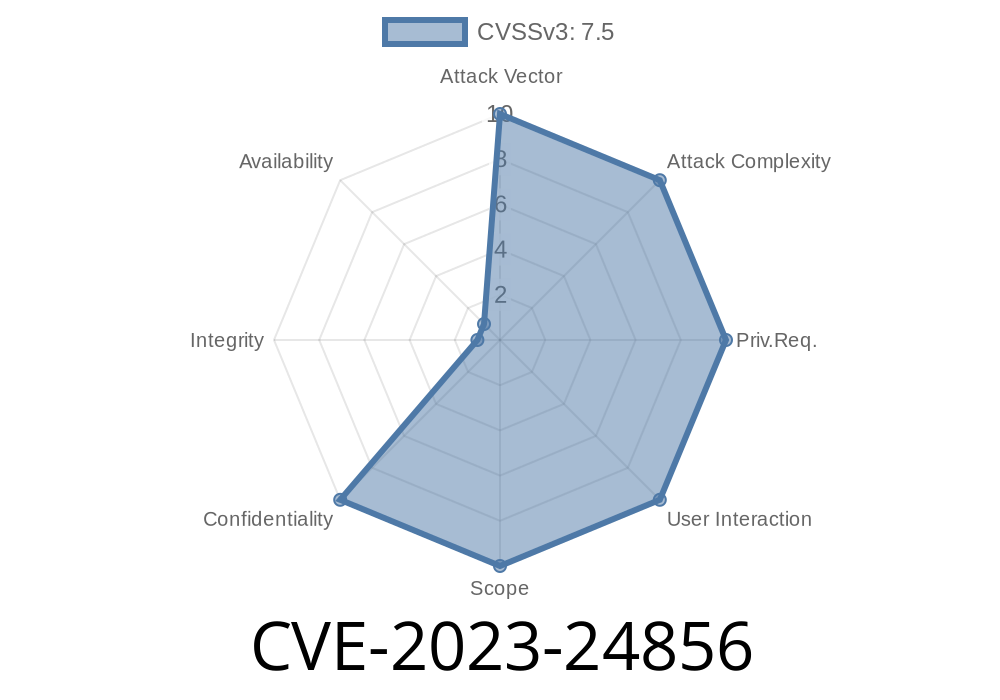In March 2023, Microsoft disclosed multiple vulnerabilities, but one that caught the attention of security professionals is CVE-2023-24856. This vulnerability affects Microsoft’s PostScript and PCL6 Class Printer Drivers and could allow information disclosure if exploited. In this post, we’ll break down what this flaw means, how it works, how attackers might exploit it, and what you can do to stay safe. We'll keep the language simple, include code snippets, link to official sources, and focus on how real-world exploitation could happen.
What is CVE-2023-24856?
This vulnerability exists in Microsoft’s PostScript and PCL6 Class Printer drivers, which are used for a wide range of printers on Windows systems. If someone with low privileges can get a specially crafted file processed through a vulnerable driver, it may expose sensitive information — potentially allowing attackers to read memory contents they shouldn’t have access to.
Here’s the official Microsoft notice:
> *"An information disclosure vulnerability exists when Windows Print Spooler improperly discloses sensitive information. An attacker who successfully exploited this vulnerability could obtain information to further compromise the user’s system."*
Why Do Printer Driver Bugs Matter?
Printer drivers run in somewhat trusted areas of the operating system. If they go wrong, especially with how they handle files or memory, an attacker could take advantage. In this case, it’s not “code execution,” but leaking system memory via a print job.
How Does the Exploit Work?
Microsoft did not publish a proof-of-concept for this bug, but based on their description and security researchers’ write-ups, a typical attack might look like this:
Attack Steps
1. Attacker sends a specially crafted print job to the printer, using the PostScript or PCL6 class driver.
The driver mishandles the data, such as by including uninitialized memory regions in the output.
3. Sensitive data (like other documents, code, or even credentials) leaks in the output file or print stream.
4. Attacker collects the printout/output, extracts sensitive data.
This scenario is more likely in shared print environments, or if printers are internet-exposed (bad idea, but common in enterprise networks).
Code Snippet: Simulating an Exploit
While we can’t supply the actual driver bug, this Python snippet demonstrates the concept: sending raw PostScript data containing unexpected commands to a printer.
Suppose we have a printer accepting jobs from the network
import socket
# Replace with your printer's IP and port
PRINTER_IP = '192.168.1.25'
PRINTER_PORT = 910 # Most network printers use 910
# Malicious PostScript payload (theoretically).
ps_payload = b"""
%!PS-Adobe
% provoke leakage by sending invalid command sequence
/InvalidOp 100 string def
InvalidOp 100 getinterval
showpage
"""
def send_print_job(ip, port, payload):
with socket.socket(socket.AF_INET, socket.SOCK_STREAM) as s:
s.connect((ip, port))
s.sendall(payload)
print("[+] Job sent!")
if __name__ == '__main__':
send_print_job(PRINTER_IP, PRINTER_PORT, ps_payload)
Note: This is a concept simulation. A real exploit would need to leverage the actual memory management bug in the driver, but the logic is: send "bad" content, extract "unexpected" content from output.
Potentially access document metadata
There’s no known way (publicly) to escalate to full code execution from this flaw, but that doesn’t mean it's harmless — sensitive info leaking from a corporate network can be very damaging.
Especially check any computers acting as print servers.
2. Check for Outdated Drivers
Replace old or custom printer drivers with the latest versions approved by Microsoft or the manufacturer.
References
- Official CVE Entry at NIST
- Microsoft Security Update Guide
- Printer Driver Bugs are a Real Threat – Sophos
- Printing System Security Issues – CERT
Conclusion
CVE-2023-24856 is a classic example of why printer driver vulnerabilities matter. Even though this isn’t a remote-code-execution bug, leaking information from memory via print jobs is a huge deal — especially in sensitive and shared environments. Always patch your systems, keep an eye on what data your printers might expose, and remember: "Just printing" can still be dangerous.
If you want to dive deeper, explore Microsoft’s update page and keep learning — fixing bugs like this keeps everyone safer.
Timeline
Published on: 03/14/2023 17:15:00 UTC
Last modified on: 06/17/2023 01:15:00 UTC
